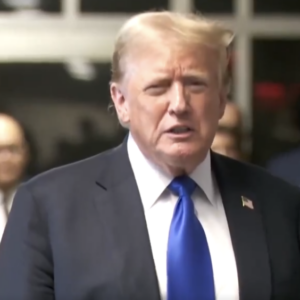For an alternative viewpoint, see Counterpoint: Trump’s Hush-Money Conviction Was Justice in Action.
If prosecutors can bring unjust cases against a presidential candidate, they can do it to anyone.
For years, a contradiction has existed in the conservative movement and the Republican Party. Conservatives have based their political philosophy and rhetoric on limiting and rolling back government power. They talk a big game when it comes to fighting tyranny. Still, there is perhaps no greater example of tyranny than the unjust use of prosecutorial power.
Yet, conservatives have refused to acknowledge that prosecutors are too powerful. If anything, Republicans share the belief that prosecutors are hamstrung in taking on crime. Recent political developments should wake up conservatives from their delusion.
Over the last year or so, we have seen prosecutors create entirely new and incoherent law theories to snag their big whale, Donald Trump. If prosecutors can openly break the rules to attack a former president using (mostly) trumped-up charges, ask yourself: Who can’t they go after?
The truth is that prosecutors get away with breaking the rules daily. Usually, the person on the receiving end isn’t a wealthy former president with reams of lawyers. In fact, the typical defendant cannot afford a lawyer and is represented by an overworked public defender. Commonly, prosecutors threaten charges with potentially long sentences unless defendants plead guilty. As a result, sometimes people plead guilty to crimes they did not commit.
The problem stems from the immense, unchecked power prosecutors enjoy. They choose who and what to prosecute and are usually never held responsible for their misconduct. There are many reasons for this unfortunate reality, but a couple are worth noting. First, prosecutors enjoy absolute immunity. That means, generally, they cannot be held civilly liable for their prosecutorial misconduct. Second, even when prosecutors commit ethical violations or break the law while prosecuting defendants, it is extremely rare for them to face any consequences for their actions, let alone be prosecuted. Usually, the violations do not even get reported in the first place.
One California study found that between 1998 and 2008, 443 reported decisions cited prosecutorial misconduct. Still, despite a legal requirement for judges to report such misconduct, none did so. In fact, there are only two instances of significant disciplinary action directed at prosecutors, and even in those cases, the punishments were relatively weak. The harshest was ten days in jail, only five of which were served. The misconduct at issue there had resulted in a false murder conviction and is believed to be the first time in American history that a prosecutor was jailed for withholding evidence.
Make no mistake: there is no shortage of prosecutorial misconduct in America. In United States v. Olsen (9th Cir. 2013), Judge Alex Kozinski explained that “Brady violations have reached epidemic proportions.” In simple terms, Brady violations occur when the government fails to disclose evidence favorable to the defense, which happens at an alarming rate. The government always works to stack the deck in its favor, often successfully.
In recent years, we have seen the rise of radical prosecutors. These prosecutors are nothing more than political enforcers. Hailed as reformers, these prosecutors make charging decisions based on “social justice” principles, heavily influenced by Marxist and critical race theory ideology. We see them go after citizens defending themselves while giving career criminals a pass.
Conservatives cannot go on pretending that there are no systemic issues in our criminal justice system that allow for this kind of abuse to flourish. The ails of our criminal justice system center on the failure to place a check on government abuse.
Our system’s almost blind trust in prosecutors is a terrible flaw. We need real reform that keeps prosecutors in check. Railing against prosecutors is not going to change anything. State legislatures and Congress must overhaul ethics rules, and state bars and prosecutors must enforce these rules and laws against offending prosecutors.
Conservatives must embrace the same principles they espouse in other policy areas when setting criminal justice policy. Being for liberty and against tyranny means being for prosecutorial reform and against unaccountable prosecutors.
Conservatives should reject tyranny in criminal justice policy in the same way they reject tyranny in taxes, guns and regulations.





